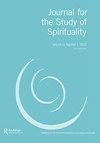Routledge international handbook of spirituality in society and the professions
IF 0.8
0 RELIGION
引用次数: 2
Abstract
This impressive volume vigorously promotes a new paradigm for human self-understanding, one that necessarily includes a spiritual dimension. Providing more than a benchmark of current thinking and research, it will serve for many as a reliable signpost, a genuine beacon of hope, lighting and brightening the way forward. For both their vision and hard work, the publishers, editors and authors are to be thanked and congratulated. Bookended by the editorial ‘Introduction’ and final ‘Way forward’, 51 chapters are arranged under six headings: ‘Facets of spirituality’; ‘Nature’; ‘Home and community’; ‘Healing’; ‘Economy, politics, and law’; and ‘Knowledge and education’. There are 68 contributing authors, from all the globe’s six inhabited continents, making this a truly international endeavor, and proving that spirituality knows no boundaries; although this very thought gives rise to an interesting problem: ‘How to define that which is boundless’. Adrian-Maria Gellel (in the chapter on ‘Children and spirituality’) suggests: ‘We may not agree on the precise definition but there is general agreement on the main elements that inform our understanding of spirituality’ (125). Wisely, the editors offer ‘a working definition [to be] used as a point of departure’ in the book’s first sentence: ‘Spirituality is people’s multiform search for a transcendent meaning of life that connects them to all living beings and brings them in touch with God or Ultimate Reality’ (3). Spiritual writer Thomas Merton (1915–1968) put it more succinctly: ‘We are all already one’ (1973, 308). With six chapters on the subject of Nature (in Part III), it is clear that this holistic vision of seamless connectivity between people, each other and the divine, also includes an intimate – thus spiritual – bond with everything else, animate and inanimate, the entirety of the cosmos. The editors and authors are, in the main, academics – university researchers and teachers – so the book has a decidedly academic flavor and thrust but, taken as a whole, it seems much more than that. Whereas each of the chapters tends to be scholarly, cautious and well-referenced, attempting to encapsulate spirituality in a specific context, read together they announce something wonderful, a significant measure of agreement in every sphere of human endeavor covered. This is important in the world today. Here, for example, is another guiding quotation from the Introduction: ‘Numerous studies document that the more people prioritize materialistic goals, the lower their well-being and the more likely they are to engage in manipulative, competitive, and ecologically degrading behaviours’ (3). Then a further claim:劳特利奇国际社会和职业精神手册
这本令人印象深刻的书大力推动了人类自我理解的新范式,其中必然包括精神层面。它不仅提供了当前思维和研究的基准,还将成为许多人可靠的路标,真正的希望灯塔,照亮和照亮前进的道路。对于他们的远见卓识和辛勤工作,出版商、编辑和作者都应该得到感谢和祝贺。在社论“引言”和最后的“前进之路”的结尾,51章被安排在六个标题下:“灵性的方面”;“自然”;“家与社区”;“治疗”;“经济、政治和法律”;以及“知识与教育”。有68位撰稿人,来自全球6个有人居住的大洲,使这成为一个真正的国际努力,并证明精神无国界;虽然这种想法也引起了一个有趣的问题:“如何定义无界”。Adrian-Maria Gellel(在“儿童与灵性”一章中)提出:“我们可能无法就精确的定义达成一致,但对于我们理解灵性的主要要素是普遍一致的”(125)。明智的是,编辑们在书的第一句话中提供了“一个可用作出发点的定义”:“灵性是人们对生命的超越意义的多种形式的探索,这种意义将他们与所有生物联系起来,并使他们与上帝或终极现实接触”(3)。灵性作家托马斯默顿(1915-1968)更简洁地说:“我们都已经是一体的”(1973,308)。这本书有六章是关于自然的主题(在第三部分),很明显,这种关于人与人之间、彼此之间和神之间无缝连接的整体观点,也包括与其他一切事物——有生命的和无生命的,以及整个宇宙——的亲密——因此是精神上的联系。本书的编辑和作者主要是学者——大学研究人员和教师——所以这本书显然有学术气息和推动力,但从整体上看,它似乎远不止于此。虽然每一章都是学术性的,谨慎的,有充分的参考,试图将灵性概括在一个特定的背景下,但读到一起,它们宣布了一些美妙的东西,在人类努力的每一个领域都有一个重要的共识。这在当今世界非常重要。例如,这里是引言中的另一个引导性引文:“大量研究表明,人们越是优先考虑物质目标,他们的幸福感就越低,他们就越有可能从事操纵、竞争和破坏生态的行为”(3)。
本文章由计算机程序翻译,如有差异,请以英文原文为准。
求助全文
约1分钟内获得全文
求助全文
来源期刊

Journal for the Study of Spirituality
RELIGION-
CiteScore
2.50
自引率
7.10%
发文量
25
期刊介绍:
Journal for the Study of Spirituality is a peer-reviewed journal which creates a unique interdisciplinary, inter-professional and cross-cultural forum where researchers, scholars and others engaged in the study and practices of spirituality can share and debate the research, knowledge, wisdom and insight associated with spirituality and contemporary spirituality studies. The British Association for the Study of Spirituality (BASS) organises a biennial international conference and welcomes enquiries about membership from those interested in the study of spirituality in the UK and worldwide. The journal is concerned with what spirituality means, and how it is expressed, in individuals’ lives and communities and in professional practice settings; and with the impact and implications of spirituality in, and on, social policy, organizational practices and personal and professional development. The journal recognises that spirituality and spiritual values can be expressed and studied in secular contexts, including in scientific and professional practice settings, as well as within faith and wisdom traditions. Thus, Journal for the Study of Spirituality particularly welcomes contributions that: identify new agendas for research into spirituality within and across subject disciplines and professions; explore different epistemological and methodological approaches to the study of spirituality; introduce comparative perspectives and insights drawn from different cultures and/or professional practice settings; aim to apply and develop sustained reflection, investigation and critique in relation to spirituality and spiritual practices; critically examine the values and presuppositions underpinning different forms of spirituality and spiritual practices; incorporate different forms of writing and expressions of spirituality.
 求助内容:
求助内容: 应助结果提醒方式:
应助结果提醒方式:


